|
History of the Separation of Church and State in America
By  - March 27, 2004 - March 27, 2004
The topic of Separation of Church and State has obviously become a
hot one in America with both the Supreme Court case regarding the
inclusion of the phrase "under God" in the Pledge of Allegiance and
President George Bush's promotion of his "faith based initiative" along
with his overtly religious tone. It's not just George Bush though,
several other public officials have voiced either support for more
inclusion of religion in government affairs, or have spoken in
opposition to restoring the tradition of secularism to the State arena.
Throughout all this it has been obvious that this is a topic that
many of us citizens feel strongly about, and it's obvious, therefore,
that this is a topic which merits some real national debate. Before a
debate can take place though, all those involved have to be educated and
knowledgeable about the topic being debated, and unfortunately neither
our public officials nor the media at large are presenting an honest and
factual case to the public about the facts that are in question.
Again and again we hear the claim that "America is a Christian nation
founded on Christianity." When the question as to whether "under God"
should be included in the Pledge of Allegiance is raised, claims are
made even by the highest level officials, such as judges, Senators and
the President, that the proof that "under God" belongs in the Pledge is
plain to see since "In God We Trust" is on our money, and we have "God"
referenced in federal oaths, and other things of this nature.
At first glance this seems very reasonable, however, as is often the
case, first glances can be misleading.
When the United States of America was founded, it represented the
most progressive political movement in Western Civilization since the
days of the Greek democracies over 2,000 years ago. The movement for
revolution, as most of us should know, was sparked by Thomas Paine, who
roused colonists' desire for freedom with his best selling book
Common Sense and then participated in the Revolution both as an
enlisted man and by writing the inspirational series
Crisis. Paine was the first to suggest the unification of the
separate states, and the first to use to term United States of
America. Paine turned over all the money he received from the sale
of his works to the Continental Army to support the cause of the
Revolution. After the American Revolution was over Paine went on to
France where he then participated in the French Revolution in his
lifelong effort to fight for freedom from tyranny. Perhaps more than any
other single man, Thomas Paine is responsible for the formation of the
United States, for as fellow revolutionary and American president John
Adams stated: "Without the pen of Paine the sword of Washington
would have been wielded in vain."
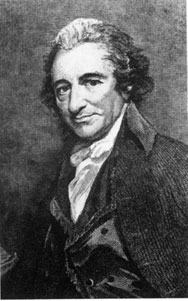
Thomas Paine
While in France Thomas Paine wrote The Rights of Man and a
book called The Age of Reason, which he sent back to America to
have published. In the introduction to The Age of Reason
Paine stated:
Fellow Citizens of the United States of America, I put the
following work under your protection. It contains my opinion upon
religion.
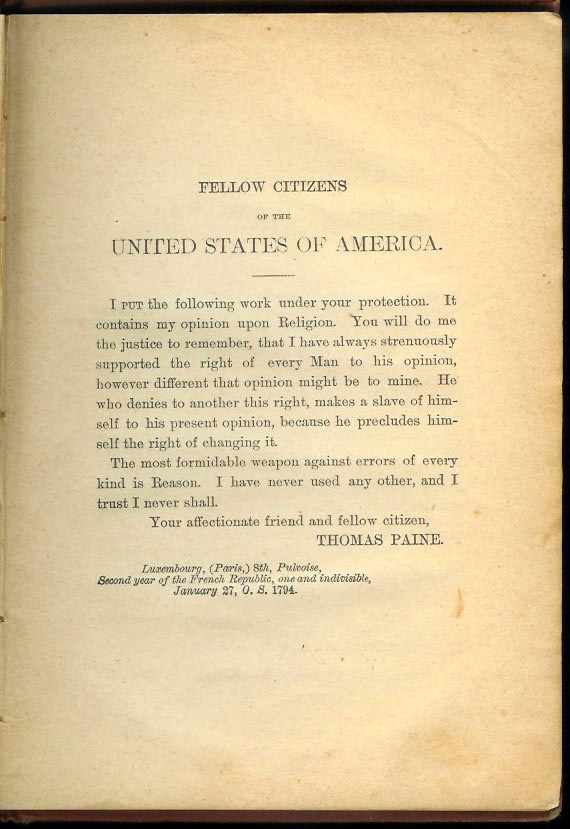
Taken from a 1889 printing of The Age of Reason
Paine went on to give his opinion of religion:
"I believe in the equality of man; and I believe that religious
duties consist in doing justice, loving mercy, and endeavoring to
make our fellow-creatures happy.
But, lest it should be supposed that I believe in many other things
in addition to these, I shall, in the progress of this work, declare
the things I do not believe, and my reasons for not believing them.
I do not believe in the creed professed by the Jewish church, by
the Roman church, by the Greek church, by the Turkish church, by the
Protestant church, nor by any church that I know of. My own mind is
my own church.
All national institutions of churches, whether Jewish, Christian or
Turkish, appear to me no other than human inventions, set up to
terrify and enslave mankind, and monopolize power and profit."
This was just the beginning. After stating that he did believe in
God, but that he felt all religions were corrupt, he went on to offer
what was to that date one of the fullest criticisms of the Bible, and he
denounced the story of Jesus as a product of Roman pagan mythology,
stating that Jesus was a good man with a good philosophy, but that all
the talk of the supernatural in the Bible was obviously nothing more
than mythology.
Other select quotes from The Age of Reason:
"Deism, then, teaches us, without the possibility of being
deceived, all that is necessary or proper to be known. The creation
is the Bible of the deist. He there reads, in the handwriting of the
Creator himself, the certainty of his existence and the immutability
of his power, and all other Bibles and Testaments are to him
forgeries."
"The opinions I have advanced… are the effect of the most clear and
long-established conviction that the Bible and the Testament are
impositions upon the world, that the fall of man, the account of
Jesus Christ being the Son of God, and of his dying to appease the
wrath of God, and of salvation by that strange means, are all
fabulous inventions, dishonorable to the wisdom and power of the
Almighty; that the only true religion is Deism, by which I then
meant, and mean now, the belief of one God, and an imitation of his
moral character, or the practice of what are called moral
virtues-and that it was upon this only (so far as religion is
concerned) that I rested all my hopes of happiness hereafter."
"Of all the systems of religion that ever were invented, there is
none more derogatory to the Almighty, more unedifying to man, more
repugnant to reason, and more contradictory in itself, than this
thing called Christianity."
"We can know God only through his works. We cannot have a
conception of any one attribute but by following some principle that
leads to it. We have only a confused idea of his power, if we have
not the means of comprehending something of its immensity. We can
have no idea of his wisdom, but by knowing the order and manner in
which it acts. The principles of science lead to this knowledge; for
the Creator of man is the Creator of science; and it is through that
medium that man can see God, as it were, face to face."
Prior to the publication of The Age of Reason,
Vermont patriot and revolutionary republican Ethan Allen wrote a book
titled Reason: The Only Oracle Of Man. In the
Preface to the book he stated:
"In the circle of my acquaintance, (which has not been small,) I
have generally been denominated a deist, the reality of which I
never disputed, being conscious I am no Christian, except mere
infant baptism make me one; and as to being a deist, I know not,
strictly speaking, whether I am one or not, for I have never read
their writings; mine will therefore determine the matter; for I have
not in the least disguised my sentiments, but have written freely
without any conscious knowledge of prejudice for, or against any
man, sectary or party whatever; but wish that good sense, truth and
virtue may be promoted and flourish in the world, to the detection
of delusion, superstition, and false religion; and therefore my
errors in the succeeding treatise, which may be rationally pointed
out, will be readily rescinded.
By the public's most obedient and humble servant.
ETHAN ALLEN"
The first chapter starts with the following passage:
"The desire of knowledge has engaged the attention of the wise and
curious among mankind in all ages which has been productive of
extending the arts and sciences far and wide in the several quarters
of the globe, and excited the contemplative to explore nature's laws
in a gradual series of improvement, until philosophy, astronomy,
geography, and history, with many other branches of science, have
arrived to a great degree of perfection."
The book is concluded with this closing statement:
"An unjust composition never fails to contain error and falsehood.
Therefore an unjust connection of ideas is not derived from nature,
but from the imperfect composition of man. Misconnection of ideas is
the same as misjudging, and has no positive existence, being merely
a creature of the imagination; but nature and truth are real and
uniform; and the rational mind by reasoning, discerns the
uniformity, and is thereby enabled to make a just composition of
ideas, which will stand the test of truth. But the fantastical
illuminations of the credulous and superstitious part of mankind,
proceed from weakness, and as far as they take place in the world
subvert the religion of REASON, NATURE and TRUTH."
Technically though, neither Thomas Paine, despite the fact that
without him America as we know it would likely not exist, nor Ethan
Allen were founders of the United States in that they were neither
signers of the Declaration of Independence nor the
Constitution.
That leads us to the Constitution and Declaration of Independence.

Preamble to the Constitution
The founding of the United States of America took place in 1787 with
the signing of the Constitution, which is a purely secular document. In
relation to religion the Constitution states:
Article VI: Clause 3: The Senators and Representatives before
mentioned, and the Members of the several State Legislatures, and
all executive and judicial Officers, both of the United States and
of the several States, shall be bound by Oath or Affirmation, to
support this Constitution; but no religious Test shall ever be
required as a Qualification to any Office or public Trust under the
United States.
In relation to taking the Oath of Office the Constitution simply
states:
Article II Section I: Before he enter on the Execution of his
Office, he shall take the following Oath or Affirmation:--"I do
solemnly swear (or affirm) that I will faithfully execute the Office
of President of the United States, and will to the best of my
Ability, preserve, protect and defend the Constitution of the United
States."
The Bill Of Rights was quickly amended to the Constitution in order
to protect the rights of citizens because the original Constitution
primarily just defined the powers of government. The third Article of
the Bill of Rights (which became the first amendment) states:
Congress shall make no law respecting an establishment of religion,
or prohibiting the free exercise thereof; or abridging the freedom
of speech, or of the press; or the right of the people peaceably to
assemble, and to petition the government for a redress of
grievances.
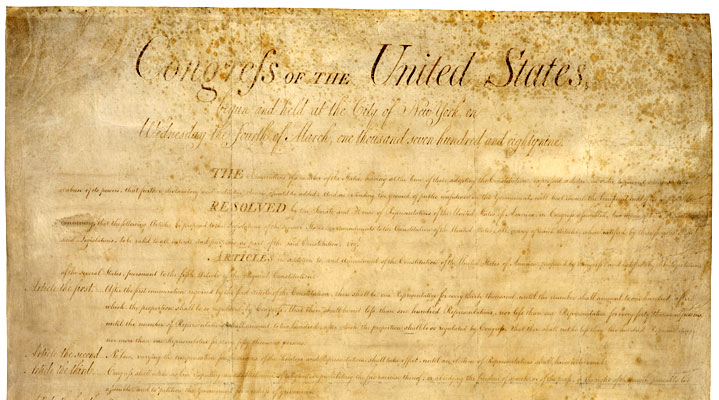
Bill of Rights including the first Amendment to the Constitution
There is often debate about what exactly the First Amendment means,
however, in an 1802 letter to the Danbury Baptists,
Thomas Jefferson made clear that the purpose of the First Amendment was
to establish a "wall of separation" between Church and State in order to
protect individuals' right of conscience:
Believing with you that religion is a matter which lies solely
between Man & his God, that he owes account to none other for his
faith or his worship, that the legitimate powers of government reach
actions only, & not opinions, I contemplate with sovereign reverence
that act of the whole American people which declared that their
legislature should "make no law respecting an establishment of
religion, or prohibiting the free exercise thereof," thus building a
wall of separation between Church & State. Adhering to this
expression of the supreme will of the nation in behalf of the rights
of conscience, I shall see with sincere satisfaction the progress of
those sentiments which tend to restore to man all his natural
rights, convinced he has no natural right in opposition to his
social duties.
Divine references are found in the Declaration of Independence
of 1776 however, which is the document that set the colonies on the road
to the formation of our country.

Introduction of the Declaration of Independence
There are four references to a deity found in the Declaration of
Independence, which was primarily co-authored by Thomas Jefferson
and Benjamin Franklin, both friends of Thomas Paine. Those phrases are:
"Nature's God," "Creator," "Supreme Judge,"
and "Divine Providence." Specifically, the
Declaration starts out:
When in the Course of human events, it becomes necessary for one
people to dissolve the political bands which have connected them
with another, and to assume among the powers of the earth, the
separate and equal station to which the Laws of Nature and of
Nature's God entitle them, a decent respect to the opinions of
mankind requires that they should declare the causes which impel
them to the separation.
The Declaration of Independence clearly asserts earthly authority,
the words "Laws of Nature" are even capitalized. In addition to reading
the usage of the word God in context, it is also important to understand
the Declaration in its own historical context. Furthermore, Benjamin
Franklin was a self-declared Deist and it was he who made the final
edits to the document.
The Declaration of Independence would have been clearly recognizable
as deistic at the time it was written. The Declaration did not, for
example, state: "In the name of The Lord God Jesus Christ," as would
have been a much more traditional reference to the Christian God in a
manner that was used by Europeans at the time. The Declaration was
written during the height of the Enlightenment when Deism was popular
and widely known. Deistic language was easy to recognize by people of
the time because Deists avoided all of the traditional references to the
Christian God. When Deists referred to "God" they used terms like
"Supreme Being", "Almighty Judge", "Creator", "God of Nature", "Nature's
God", etc. On the other hand Christians typically used terms like "the
Lord", "Jesus Christ", "God", "Savior", etc.
The reference to "Laws of Nature" is an even more direct reference to
Deism, because the deistic belief was that some supreme being created
the universe and the laws of nature and the rest of what progressed from
that point on followed the laws of nature. Most Deists did not believe
in divine intervention or supernatural occurrences, and they definitely
did not believe that Jesus was the son of God. Mention of the Laws of
Nature would have been an extremely obvious reference to Deism in 1776.
In addition to all of this, there was a reference to Christianity in
Thomas Jefferson's first draft of the Declaration of
Independence, however the reference was not positive. In
Jefferson's rough draft he wrote:
he has waged cruel war against human nature itself, violating it's
most sacred rights of life & liberty in the persons of a distant
people who never offended him, captivating & carrying them into
slavery in another hemisphere, or to incur miserable death in their
transportation thither. this piratical warfare,
the opprobrium [disgrace] of infidel powers, is the warfare of the
Christian king of Great Britain. determined to keep open a
market where Men should be bought & sold, he has prostituted his
negative for suppressing every legislative attempt to prohibit or to
restrain this execrable commerce: and that this assemblage of
horrors might want no fact of distinguished die, he is now exciting
those very people to rise in arms among us, and to purchase that
liberty of which he has deprived them, & murdering the people upon
whom he also obtruded them; thus paying off former crimes committed
against the liberties of one people, with crimes which he urges them
to commit against the lives of another.
So, claims that references to a deity in the Declaration of
Independence prove that America was founded on Christianity are
dubious at best. The Declaration is clearly deistic when read
in its own historical context and it was co-authored by America's two
most strongly deistic founders. What has to be recognized is that the
Declaration of Independence, including the manner in which it
referred to God, was a very progressive document; in fact, it was
"revolutionary."
What about the founders then?
The majority of the 100 plus founders were Christians, as were
virtually all Europeans at that time. Of the Christian founders, most
were very progressive in their views and were among the staunchest
proponents of separation of Church and State. Some founders, including
many of the most prominent, are known to have been Deists as well.
Thomas Paine is of course the best example of an American Deist, but
Benjamin Franklin also declared himself a Deist and Thomas Jefferson
also wrote his own version of the Bible in which he took out all of the
supernatural events of the New Testament. Benjamin Franklin is the only
founder to have signed all three of the founding documents: the
Declaration of Independence, The Treaty of Paris, and The
Constitution. While Jefferson declared himself a "true Christian"
(to Jefferson most priests and evangelicals were not "true Christians"),
he also later declared himself an Epicurean. Epicures was a Greek
materialist philosopher.
In a letter to William Short
Jefferson proclaimed that, "[t]he immaculate
conception of Jesus, his deification, the creation of the world by him,
his miraculous powers, his resurrection and visible ascension, his
corporeal presence in the Eucharist, the Trinity; original sin,
atonement, regeneration, election, orders of Hierarchy, etc., [were all]
invented by ultra-Christian sects, unauthorized by a single word ever
uttered by him."
He followed up that letter with another stating that,
"[i]t is not to be understood that I am with him
(Jesus Christ) in all his doctrines. I am a Materialist; he takes the
side of Spiritualism; he preaches the efficacy of repentance toward
forgiveness of sin; I require a counterpoise of good works to redeem
it..."
It is widely known, though, that George Washington took his Inaugural
Oath using a Bible and it has long been believed that he ad-libbed the
words "so help me God" to the end of the Constitutionally prescribed
Oath of Office as well, however the evidence shows this not to be the
case. It appears the claim that George Washington added "so help me
God," to the end of his oath originated some time in the 1850s. There is
a record of the inauguration and the record records Washington's word
and makes no mention of "so help me God."
In addition to the Presidential Oath, the original Congressional oath
also lacked "so help me God," but this phrase was added to the
Congressional Oath in 1884.
For more on this see:
Boston 1775: Swearing into Office "So Help Me God"
In relation to Washington's use of a Bible for the swearing in
ceremony: This was not George Washington's idea, in fact no one brought
a Bible to the ceremony. The state law of New York, which was where the
ceremony was taking place, required that a Bible be used when taking an
oath. George Washington was not prepared for this and the ceremony was
held up while a search for a Bible was conducted. One was located in a
nearby Freemason's Lodge, and the Mason's Bible was used in the
ceremony. George Washington himself was a Freemason. The Freemasons were
(and still are) a semi-secret organization, which at that time held very
progressive religious views and had as part of their program an agenda
of promoting religious tolerance. It was not required that members be
Christian to be a Freemason, only that they believe in a supreme being.
This requirement made it possible for Deists to join, or for that matter
Jews and Muslims - something very progressive for the time. In fact,
many Freemasons were Deists.
On the matter of separation of Church and State and religious
liberties it is helpful to see exactly what the founders said on the
matter in order to understand their opinion of it.
A sampling of quotes from American founders:
The United States of America have exhibited, perhaps, the first
example of governments erected on the simple principles of nature;
and if men are now sufficiently enlightened to disabuse themselves
of artifice, imposture, hypocrisy, and superstition, they will
consider this event as an era in their history. Although the detail
of the formation of the American governments is at present little
known or regarded either in Europe or in America, it may hereafter
become an object of curiosity. It will never be pretended that any
persons employed in that service had interviews with the gods, or
were in any degree under the influence of Heaven, more than those at
work upon ships or houses, or laboring in merchandise or
agriculture; it will forever be acknowledged that these governments
were contrived merely by the use of reason and the senses....
Unembarrassed by attachments to noble families, hereditary lines
and successions, or any considerations of royal blood, even the
pious mystery of holy oil had no more influence than that other of
holy water: the people universally were too enlightened to be
imposed on by artifice; and their leaders, or more properly
followers, were men of too much honour to attempt it. Thirteen
governments thus founded on the natural authority of the people
alone, without a pretence of miracle or mystery, which are destined
to spread over the northern part of that whole quarter of the globe,
are a great point gained in favour of the rights of mankind.
-- President John Adams: "A Defense of the
Constitutions of Government of the United States of America"
(1787-88)
When a religion is good, I conceive it will support itself; and
when it does not support itself, and God does not take care to
support it so that its professors are obliged to call for help of
the civil power, 'tis a sign, I apprehend, of its being a bad one.
- Benjamin Franklin: in letter to Richard
Price, October 9, 1780
My parents had early given me religious impressions, and brought me
through my childhood piously in the Dissenting [Protestant] way. But
I was scarce fifteen, when, after doubting by turns of several
points, as I found them disputed in the different books I read, I
began to doubt of Revelation itself. Some books against Deism fell
into my hands; they were said to be the substance of sermons
preached at Boyle's Lectures. It happened that they wrought an
effect on me quite contrary to what was intended by them; for the
arguments of the deists, which were quoted to be refuted, appeared
to me much stronger than the refutations; in short, I soon became a
thorough deist.
- Autobiography of Benjamin Franklin, 1793
History, I believe, furnishes no example of a priest-ridden people
maintaining a free civil government. This marks the lowest grade of
ignorance of which their civil as well as religious leaders will
always avail themselves for their own purposes.
-- President Thomas Jefferson: in letter to
Alexander von Humboldt, December 6, 1813
Where the preamble declares, that coercion is a departure from the
plan of the holy author of our religion, an amendment was proposed
by inserting "Jesus Christ," so that it would read "A departure from
the plan of Jesus Christ, the holy author of our religion;" the
insertion was rejected by the great majority, in proof that they
meant to comprehend, within the mantle of its protection, the Jew
and the Gentile, the Christian and Mohammedan, the Hindoo and
Infidel of every denomination.
-Thomas Jefferson, Autobiography, in
reference to the Virginia Act for Religious Freedom
If we did a good act merely from the love of God and a belief that
it is pleasing to Him, whence arises the morality of the Atheist? It
is idle to say, as some do, that no such thing exists. We have the
same evidence of the fact as of most of those we act on, to wit:
their own affirmations, and their reasonings in support of them. I
have observed, indeed, generally, that while in Protestant countries
the defections from the Platonic Christianity of the priests is to
Deism, in Catholic countries they are to Atheism. Diderot,
D'Alembert, D'Holbach, Condorcet, are known to have been among the
most virtuous of men. Their virtue, then, must have had some other
foundation than love of God.
-- President Thomas Jefferson: in letter to
Thomas Law, June 13, 1814
Because religious belief, or non-belief, is such an important part
of every person's life, freedom of religion affects every
individual. State churches that use government power to support
themselves and force their views on persons of other faiths
undermine all our civil rights. Moreover, state support of the
church tends to make the clergy unresponsive to the people and leads
to corruption within religion. Erecting the "wall of separation
between church and state," therefore, is absolutely essential in a
free society.
We have solved ... the great and interesting
question whether freedom of religion is compatible with order in
government and obedience to the laws. And we have experienced the
quiet as well as the comfort which results from leaving every one to
profess freely and openly those principles of religion which are the
inductions of his own reason and the serious convictions of his own
inquiries.
- President Thomas Jefferson: in a speech to
the Virginia Baptists (1808)
In the two statements above, Thomas Jefferson clearly extends the
right of religious freedom to atheists and non-believers as well, with
equal respect. The above statement was his second use of the term "wall
of separation between church and state."
Manufacturers, who listening to the powerful invitations of a
better price for their fabrics, or their labor, of greater cheapness
of provisions and raw materials, of an exemption from the chief part
of the taxes burdens and restraints, which they endure in the old
world, of greater personal independence and consequence, under the
operation of a more equal government, and of what is far more
precious than mere religious toleration--a perfect equality of
religious privileges; would probably flock from Europe to the United
States to pursue their own trades or professions, if they were once
made sensible of the advantages they would enjoy, and were inspired
with an assurance of encouragement and employment, will, with
difficulty, be induced to transplant themselves, with a view to
becoming cultivators of the land.
- Treasury Secretary Alexander Hamilton:
Report on the Subject of Manufacturers December 5, 1791
Here Alexander Hamilton noted that "a perfect equality" of
all religious privileges would be a quality that would draw immigrants
to America, something that he wanted to promote.
Strongly guarded as is the separation between Religion and
Government in the Constitution of the United States, the danger of
encroachment by Ecclesiastical Bodies, may be illustrated by
precedents already furnished in their short history.
- James Madison; Monopolies, Perpetuities,
Corporations, Ecclesiastical Endowments
Who does not see that the same authority which can establish
Christianity, in exclusion of all other Religions, may establish
with the same ease any particular sect of Christians, in exclusion
of all other Sects? that the same authority which can force a
citizen to contribute three pence only of his property for the
support of any one establishment, may force him to conform to any
other establishment in all cases whatsoever?
...
If Religion be not within the cognizance of Civil Government how
can its legal establishment be necessary to Civil Government? What
influence in fact have ecclesiastical establishments had on Civil
Society? In some instances they have been seen to erect a spiritual
tyranny on the ruins of the Civil authority; in many instances they
have been seen upholding the thrones of political tyranny: in no
instance have they been seen the guardians of the liberties of the
people. Rulers who wished to subvert the public liberty, may have
found an established Clergy convenient auxiliaries. A just
Government instituted to secure & perpetuate it needs them not. Such
a Government will be best supported by protecting every Citizen in
the enjoyment of his Religion with the same equal hand which
protects his person and his property; by neither invading the equal
rights of any Sect, nor suffering any Sect to invade those of
another.
- James Madison; Memorial and Remonstrance
Against Religious Assessments, 1785
The settled opinion here is, that religion is essentially distinct
from civil Government, and exempt from its cognizance; that a
connection between them is injurious to both;
- James Madison; Letter to Edward Everett,
March 18, 1823
Nothwithstanding the general progress made within the two last
centuries in favour of this branch of liberty, & the full
establishment of it, in some parts of our Country, there remains in
others a strong bias towards the old error, that without some sort
of alliance or coalition between Gov' & Religion neither can be duly
supported: Such indeed is the tendency to such a coalition, and such
its corrupting influence on both the parties, that the danger cannot
be too carefully guarded agst.. And in a Gov' of opinion, like ours,
the only effectual guard must be found in the soundness and
stability of the general opinion on the subject. Every new &
successful example therefore of a perfect separation between
ecclesiastical and civil matters, is of importance. And I have no
doubt that every new example, will succeed, as every past one has
done, in shewing that religion & Gov will both exist in greater
purity, the less they are mixed together;
- President James Madison, 1822
These are by no means the only comments made on the subject of
religion by these men, just a small sampling of some of their views on
the matter. The last quote is of special importance in relation to
another subject of American history, that being the existence of laws
relating to religion among the states and the influence of devoutly
religious colonists and early citizens.
It is certainly true that there were a great many highly Christian
groups in early America, however it was in fact these very people that
some of the founders were at odds with, as President Madison made clear
in the quote above, calling those looking to retain a role of religion
in government of "the old error." He noted that there were such
people in America, however these were not the people who founded America
and established it as the most progressive country in the world at the
time.
Furthermore, in 1797, in an attempt to establish peaceful relations
with Muslims off the Northern Coast of Africa (an attempt that failed
and led to the Barbary Wars), the Treaty of Tripoli was ratified by the
Senate. Article 11 of the treaty states:
As the Government of the United States of America is not, in any
sense, founded on the Christian religion; as it has in itself no
character of enmity against the laws, religion, or tranquillity, of
Musselmen; and as the said States never have entered into any war or
act of hostility against any Mehomitan nation, it is declared by the
parties that no pretext arising from religious opinions shall ever
produce an interruption of the harmony existing between the two
countries.
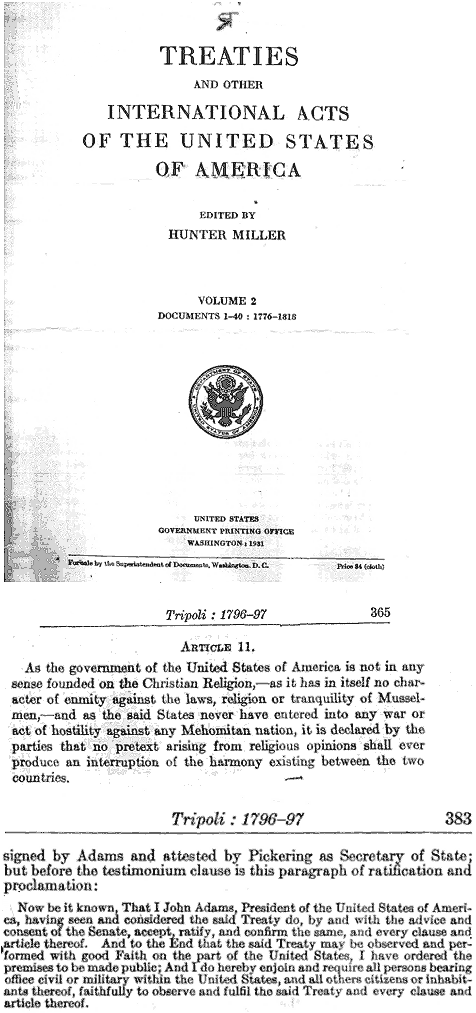
Treaty of Tripoli
That is as plain as the issue of the government of America being
founded on Christianity can be stated. This treaty was written during
the end of Washington's presidency and signed by John Adams, with the
above statement included, once he became president.
The Treaty of Tripoli was later used in 1899 during the McKinley
administration to establish peace with Philippine Muslims during the
Spanish American War. The US Ambassador to Turkey used the eleventh
article of the Treaty of Tripoli to prove to the Islamic Caliph (the
Caliph is like the Muslim version of the Pope) that the United
States would respect the religion of the Muslims in the Philippines,
which resulted in the Caliph's endorsement of the US occupation.
Let it not be presumed, though, that America was without any laws
concerning religion. Prior to the signing of The Constitution in 1787,
several states established laws which required that a person believe in
God, or even be a Protestant, in order to hold certain public offices.
For example in North Carolina's 1776 constitution
it stated:
XXXII: That no person, who shall deny the being of God or the truth
of the Protestant religion, or the divine authority either of the
Old or New Testaments, or who shall hold religious principles
incompatible with the freedom and safety of the State, shall be
capable of holding any office or place of trust or profit in the
civil department within this State.
Massachusetts' 1780 constitution
stated:
Chapter I; Art. II: It is the right as well as the duty of all men
in society, publicly and at stated seasons, to worship the Supreme
Being, the great Creator and Preserver of the universe. And no
subject shall be hurt, molested, or restrained, in his person,
liberty, or estate, for worshipping God in the manner and season
most agreeable to the dictates of his own conscience, or for his
religious profession or sentiments, provided he doth not disturb the
public peace or obstruct others in their religious worship.
Chapter II; Art. II. The governor shall be chosen annually; and no
person shall be eligible to this office, unless, at the time of his
election, he shall have been an inhabitant of this commonwealth for
seven years next preceding; and unless he shall, at the same time,
be seized, in his own right, of a freehold, within the commonwealth,
of the value of one thousand pounds; and unless he shall declare
himself to be of the Christian religion.
Massachusetts was traditionally a very puritanical state and was also
the colony where the infamous Salem Witch Trials took place,
during which 25 people were killed for suspicion of being witches; 160
people were accused altogether, many of which were jailed, ostracized,
or had their property confiscated from them.
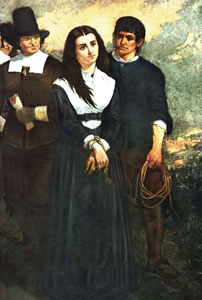
The 1777 Georgia Constitution
stated:
Article VI. The representatives shall be chosen out of the
residents in each county, who shall have resided at least twelve
months in this State, and three months in the county where they
shall be elected; except the freeholders of the counties of Glynn
and Camden, who are in a state of alarm, and who shall have the
liberty of choosing one member each, as specified in the articles of
this Constitution, in any other county, until they have residents
sufficient to qualify them for more; and they shall be of the
Protestant on, and of the age of twenty-one years, and shall be
possessed in their own right of two hundred and fifty acres of land,
or some property to the amount of two hundred and fifty pounds.
After the passing of The Constitution of the United States of
America, most of these states rewrote their constitutions to embrace the
same type of secularism that was outlined in The Constitution. A
handful, however, did not do so right way. Others, like Massachusetts,
retained their religious regulations for a number of years, but
they also eventually removed religious tests from their state
constitutions. Eventually, with the passing of the 14th Amendment after
the Civil War, the Bill of Rights was extended to the states in such a
way that state constitutions could not contradict the federal
constitution.
Religious discrimination did still take place after the initial
signing of the Constitution. In fact, Jews
were denied the right to vote in many states. In North Carolina, for
example, Jews were not allowed to vote until 1860.
Interestingly, some states had also established laws that banned
members of the clergy from political office as well.
Delaware, Georgia, Kentucky, New York, South Carolina and Tennessee
all denied the ability to hold public office to members of the clergy
with laws such as the following from the New York 1777 Constitution:
XXXIX. And whereas the ministers of the gospel are, by their
profession, dedicated to the service of God and the care of souls,
and ought not to be diverted from the great duties of their
function; therefore, no minister of the gospel, or priest of any
denomination whatsoever, shall, at any time hereafter, under any
presence or description whatever, be eligible to, or capable of
holding, any civil or military office or place within this State.
This definitely indicates the degrees to which the separation of
Church and State was taken seriously, even at the state level prior to
the signing of the federal Constitution.
In relation to the Pledge of Allegiance itself, when the Pledge of
Allegiance was written in 1892 it read:
I pledge allegiance to my Flag and the Republic for which it
stands, one nation, indivisible, with liberty and justice for all.
This is a fact that is easy to verify and a part of relatively
well-known public record. Why then is this fact not stated more often in
the debate surrounding the inclusion of "under God" in the Pledge? It's
easy to understand that many Americans feel the way they do about the
Pledge when so few know that it was originally written without the words
"under God" in it.
Another common fact that is noted to support the legitimacy of
references to God in the Pledge, federal oaths and mottos is the use of
"In God We Trust" on our money. The first uses of "In God We Trust" on
money did not appear until 1860 on privately minted coins. "In God We
Trust" was later legally allowed to be printed on coins in 1865. The
1865 law allowing the use of "In God We Trust" on coins did not require
it to be used however, and not all coins carried this motto.
Below is the continental dollar of the Revolutionary War, which was
designed by Benjamin Franklin in 1776:
The mottos on this coin are "Mind Your Business" and "We Are One."
During the Revolutionary War states issued their own currencies as
well. This fifty dollar note from South Carolina makes no mention of
God, and in fact has an image from Greek mythology on the back of the
note, depicting Atlas. The motto in Latin on the front of the bill
reads: "Let foresight guide our people."
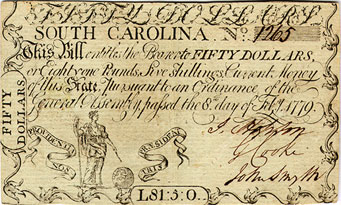
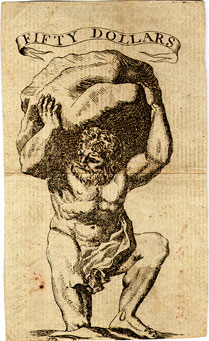
The back of this ninety dollar South Carolina note depicts Hercules
wrestling a lion:
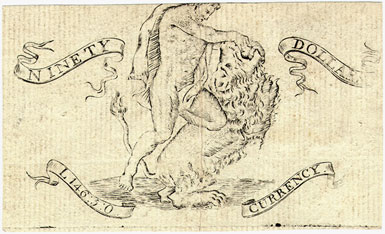
In 1837 Congress passed an Act that specified which mottos and
phrases were allowed to be printed on currency; this included the
national motto, "E Pluribus Unum" (From Many [comes] One). The motto was
not required however.
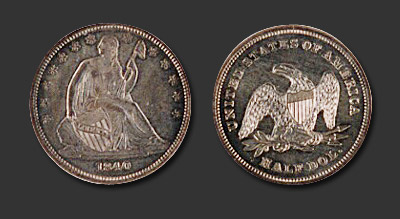
1840 Half Dollar
In 1865, with the conclusion of the Civil War, a new Act was passed
by Congress to allow the addition of the phrase "In God We Trust" to
currency. "In God We Trust" was still not the national motto at this
point and was not used on all money. It was simply allowed to be used on
coins, and was used mostly on small denomination coins along with the
national motto, "E Pluribus Unum."
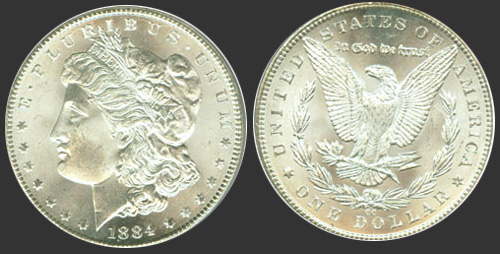
1884 dollar coin with "In God We Trust"
States and private banks issued their own paper currency prior to the
creation of the Federal Reserve. The following are examples of bills and
state issued notes from the 1800s, most of which are the same on both
sides:
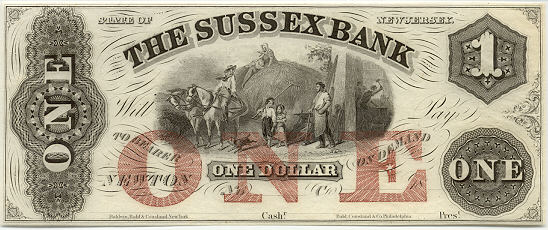
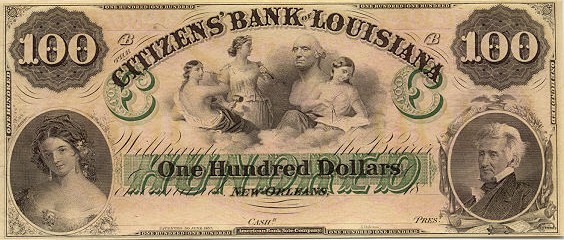
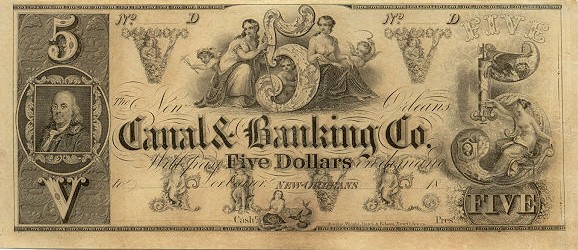
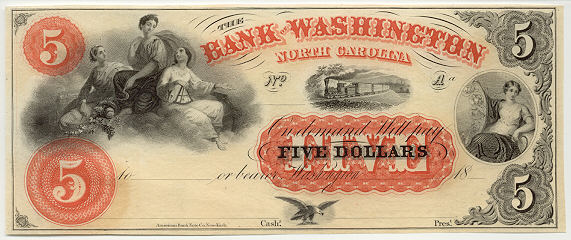
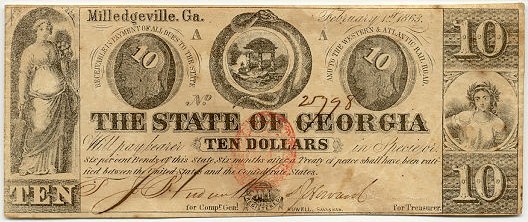
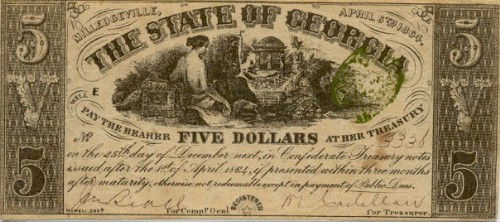
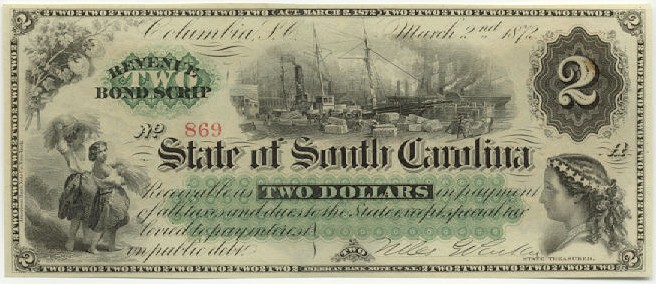
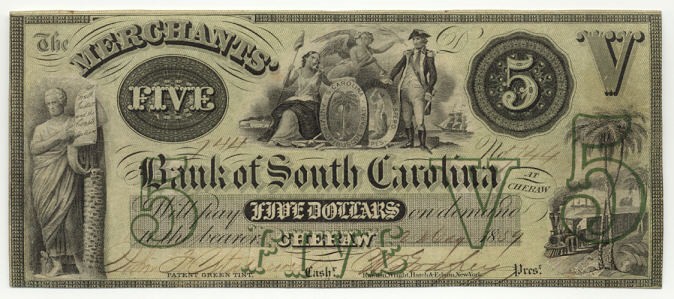
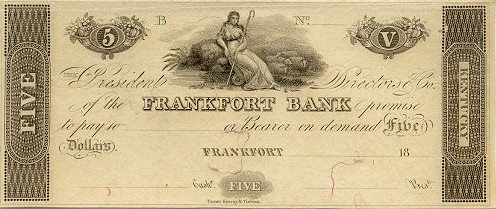
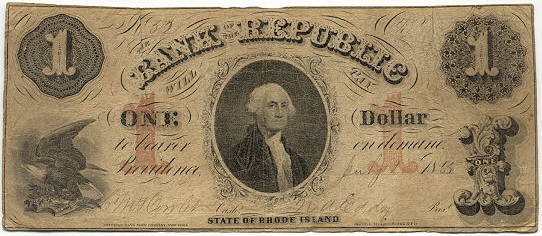
You should notice of course the common use of both the female form
(often representing Liberty, Victory or Minerva) and classical imagery.
The motto "In God We Trust" was not used on paper money.
Below are examples of federal currency issued prior to the creation
of the Federal Reserve.
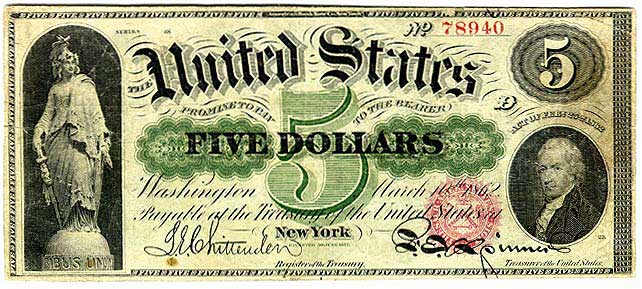
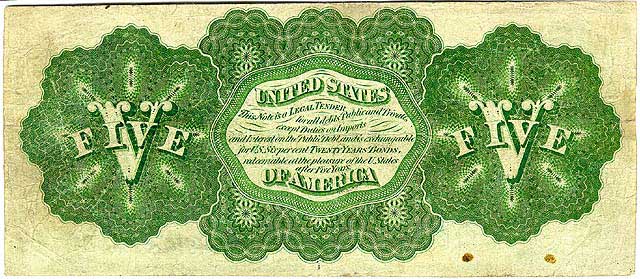
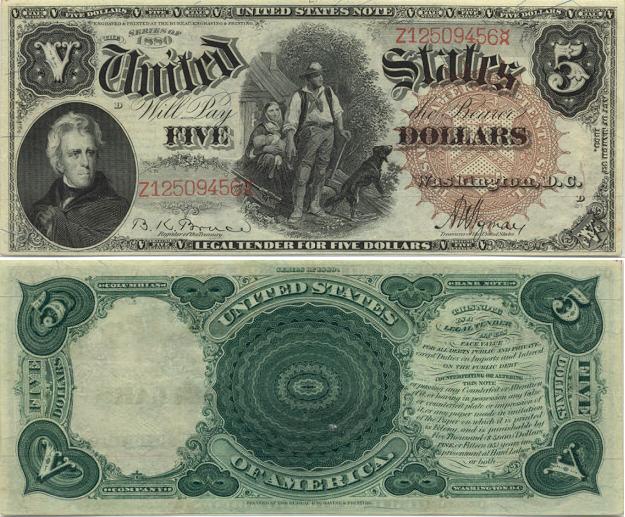
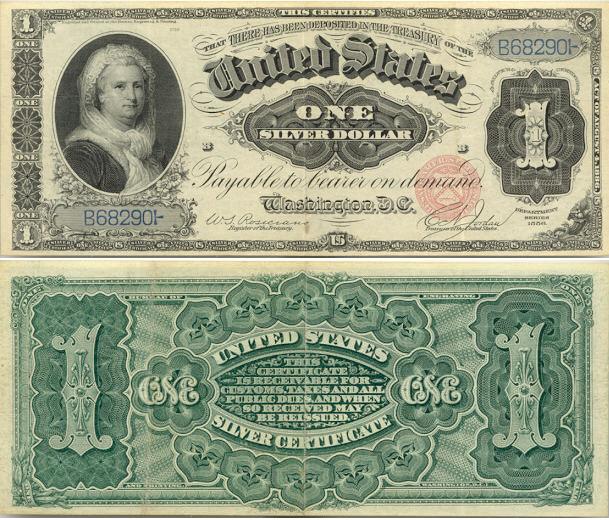
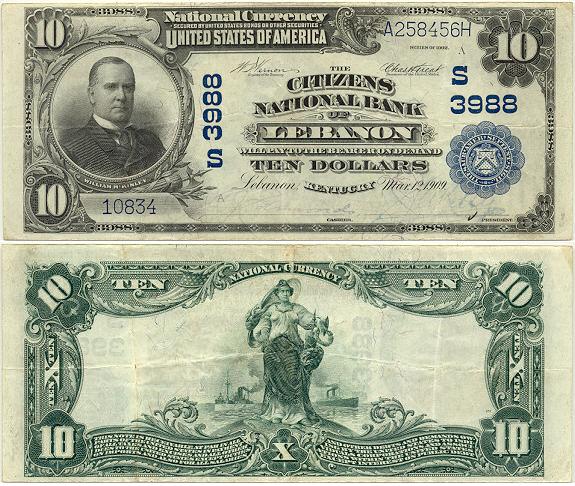
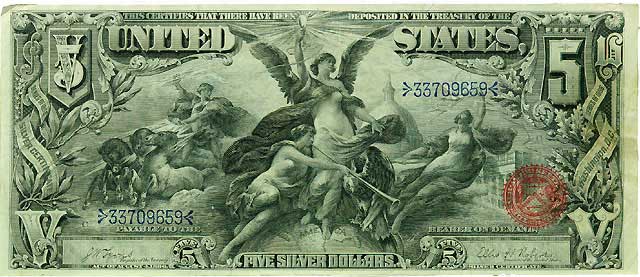
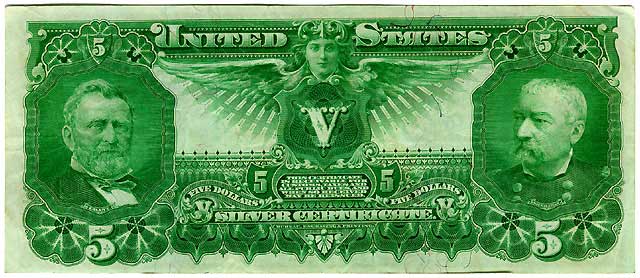
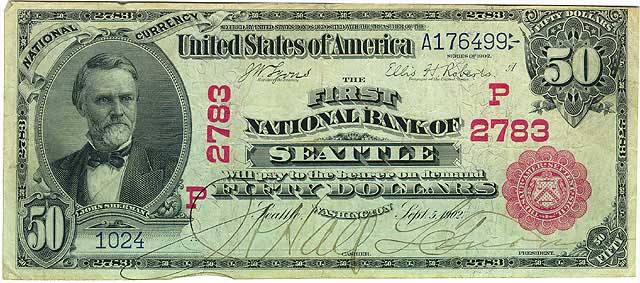
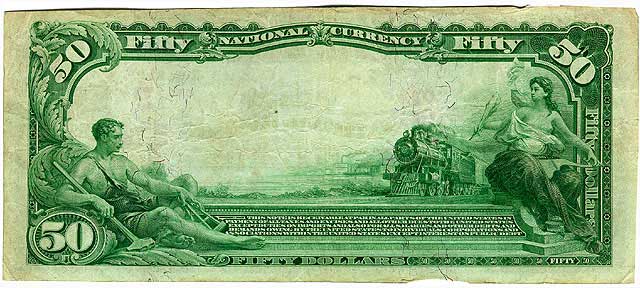
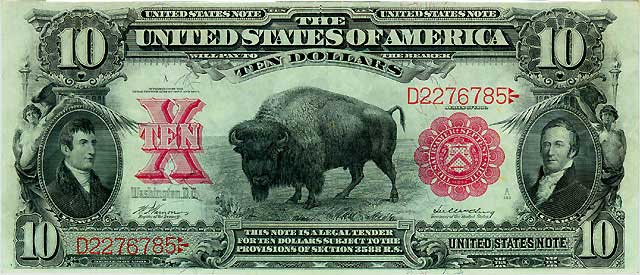
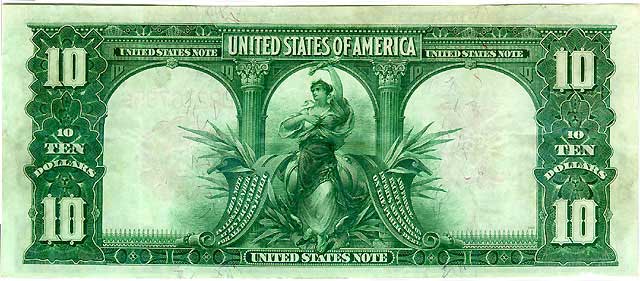
When the Federal Reserve was created in 1913 "In God We Trust"
remained absent from paper currency.
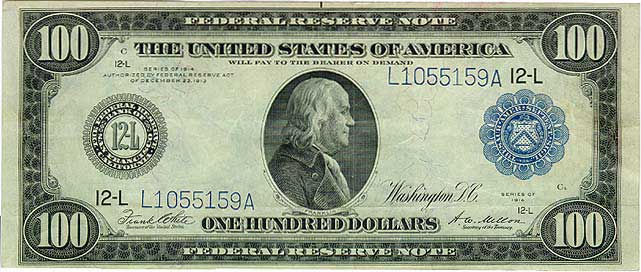
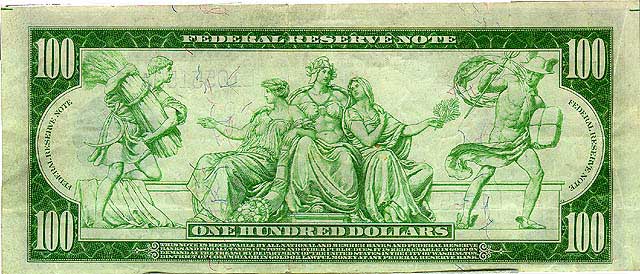
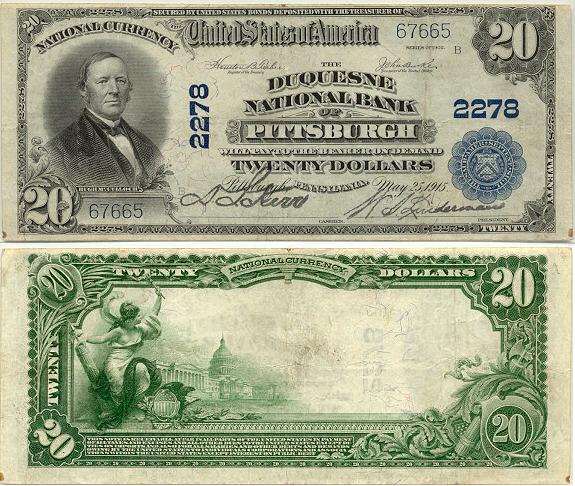


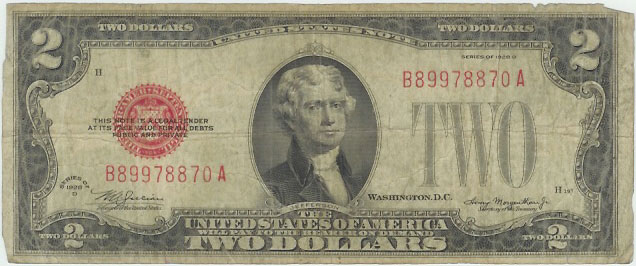
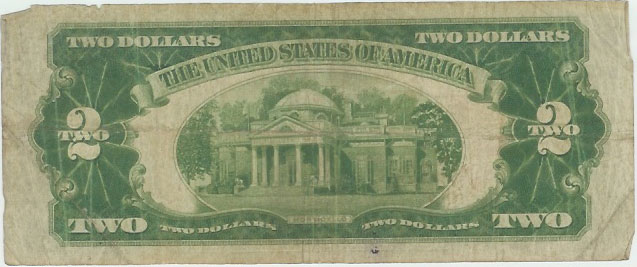
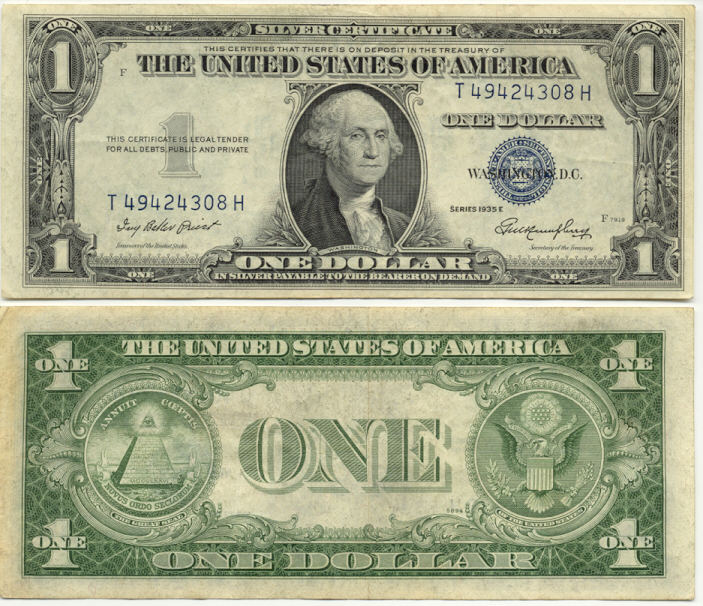
For more on the history of American currency see:
Historical American Currency Exhibit
The fact is that the majority of references to God in our government
came during the 1950s.
In regard to the use of "In God We Trust" on currency the
Federal Bureau of Engraving and Printing
states:
The use of the national motto on both U.S. coins and currency notes
is required by two statutes, 31 U.S.C. 5112(d) (1) and 5114(b),
respectively. The motto was not adopted for use on U.S. paper
currency until 1957. It first appeared on some 1935G Series $1
Silver Certificates, but didn't appear on U.S. Federal Reserve Notes
until the Series 1963 currency.
In the 1950s Congress changed the national motto from "E Pluribus
Unum" to "In God We Trust" (which is how "In God We Trust" became
required to be printed of federal money), "So help me God" was added to
federal oaths (despite the fact that the Christian Bible clearly states
not to swear by God or any other person, place, or thing when taking an
oath. Matthew 5:33-37, James 5:12), and "under God" was added to the
Pledge of Allegiance.
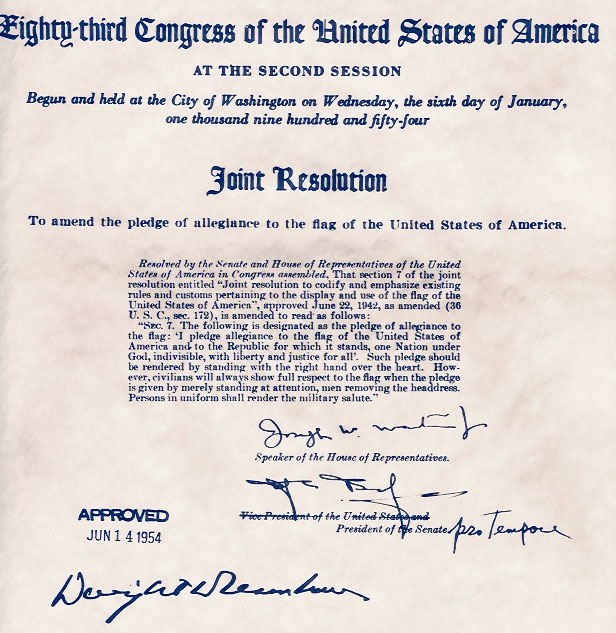
The Pledge of Allegiance is currently 112 years old. Throughout over
half of its existence it has been without the phrase "under God" in it.
Furthermore, our country existed for over 100 years prior to that with
no pledge at all!
Now, with all of this in mind, it is interesting to reflect on
comments made by public officials and commentators on the matters of
religious references in government, such as this quote from CNN on March 24, 2004:
Justice Sandra Day O'Connor said there "are so many references to
God" in public affairs, noting "In God We Trust" was on U-S currency
and coins. She added the Supreme Court opens all its public sessions
with the words, "God save the United States and this honorable
Court."
Yes, this is true, but as has already been shown, these references
were added during the same time period, the 1950s.
On September 4, 2002 Michael Newdow was a guest on the popular FOX
program Hannity & Colmes. On this program Mr. Newdow stated that
he felt that Congressional Chaplains violated the Separation of Church
and State. Sean Hannity responded by saying:
"Who hired the first chaplain for congress? ...James Madison in
1789. Did you know that?"
You want to refer to some liberal activist judge..., that's fine,
but I'm going to go directly to the source. The author of the Bill
of Rights [James Madison] hired the first chaplain in 1789, and I
gotta' tell ya' somethin', I think the author of the Bill of Rights
knows more about the original intent--no offense to you and your
liberal atheist activism--knows more about it than you do."
Mr. Newdow had no response, but as it turns out, Mr. Hannity was
completely wrong. There was, however, no way to check the facts on the
show and thus Mr. Hannity's point stood. The fact is, though, that a
Congressional Chaplain was appointed while James Madison was President,
but Madison opposed the action. In Monopolies, Perpetuities,
Corporations, Ecclesiastical Endowments, James Madison wrote:
Is the appointment of Chaplains to the two Houses of Congress
consistent with the Constitution, and with the pure principle of
religious freedom? In strictness the answer on both points must be
in the negative. The Constitution of the U. S. forbids everything
like an establishment of a national religion. The law appointing
Chaplains establishes a religious worship for the national
representatives, to be performed by Ministers of religion, elected
by a majority of them, and these are to be paid out of the national
taxes. Does this not involve the principle of a national
establishment, applicable to a provision for a religious worship for
the Constituent as well as of the representative Body, approved by
the majority, and conducted by Ministers of religion paid by the
entire nation?
Clearly, not only was Mr. Hannity wrong, but he was very wrong,
however, his statement was presented as fact on national television.
On March 20, 2004 the Seattlepi reported on the Pledge of Allegiance
case stating that:
The appeals court ruling ignited a political fury. President Bush
called the appeals court decision "ridiculous." Senate Minority
Leader Sen. Tom Daschle, D-S.D., described it as "nuts."
The House of Representatives quickly approved, in a 400-7 vote, a
resolution urging the Supreme Court to reverse the decision because
it was "clearly inconsistent" with the views of the framers of the
Constitution. The Senate voted 99-0 for a resolution supporting the
current version of the pledge.
I have to wonder how exactly such a majority of elected officials in
America today can state that a secular pledge would be "clearly
inconsistent" with the views of the framers of the Constitution. The
framers were the very people who established the separation of
Church and State, and not only that, but led the Western world by being
the first to do so. The separation of Church and State was
central to the framing of the Constitution in fact, a document
that is purely secular. The founders chose a secular national motto and
they wrote frequently about the need for separation of Church and State
- as Thomas Jefferson put it: a "wall of separation;" as James
Madison put it: a "perfect separation."
The founders had every opportunity to create religious mottos,
creeds, and pledges, but they didn't do it. The issue of
separation of Church and State is clearly an important one, and one that
deserves national debate, but it deserves honest debate with both sides
being fairly heard. When an issue is this important we can't afford to
simply let rhetoric and ignorance dominate the discussion. The
separation of Church and State was central to the founding of the United
States of America, more than anything else that was the revolutionary
action of the founders that put America at the forefront of the
Enlightenment Era and made America a beacon of liberty.
It also needs to be clear to everyone that in trying to preserve
secularism in government, or in cases such as the Pledge of Allegiance
case, when trying to restore secularism to government, that the
secularists are really the ones on the side of tradition. Many who
support the use of religious references and religious programs in
government claim that the use of religion in government is a matter of
American tradition, but in fact it is not. Virtually all of the major
references to religion in the federal government have come within the
past 50 years. These references do not represent long
held American traditions, in fact it can be argued that the mixing of
State and religion that has taken place in America over the past 50
years is exactly what the founding fathers warned against.
Besides the danger of a direct mixture of
religion and civil government, there is an evil which ought to be
guarded against in the indefinite accumulation of property from the
capacity of holding it in perpetuity by ecclesiastical corporations.
The establishment of the chaplainship in
Congress is a palpable violation of equal rights as well as of
Constitutional principles.
The danger of silent accumulations and
encroachments by ecclesiastical bodies has not sufficiently engaged
attention in the U.S.
- James Madison, being outvoted in the bill
to establish the office of Congressional Chaplain
Indeed, the accumulations and encroachments by ecclesiastical bodies
have been silently engaged in for some time now, centuries, but the
encroachment has been consistent and today it has grown to a level where
it is no longer silent.
The separation of Church and State is not meant to hinder religion,
or to deny the role of religion in society or in our history. Many of
the founders were Christians, even James Madison was a Christian, but
what they established was a government that was non-religious - a
secular government. That does not mean that they rejected religion;
their purpose was to establish a government whose sole function was to
administer earthy matters, while matters of religion were left purely to
ecclesiastical institutions. The founders, by and large, were very much
supportive of the role of religion in society, but they
separated the ideas of society and government, leaving religion to play
a role in society, not government.
If we are going to have national debate on this issue, please, can we
at least do it honestly?
See Also:
The
Ten Commandments, American History and American Law
|